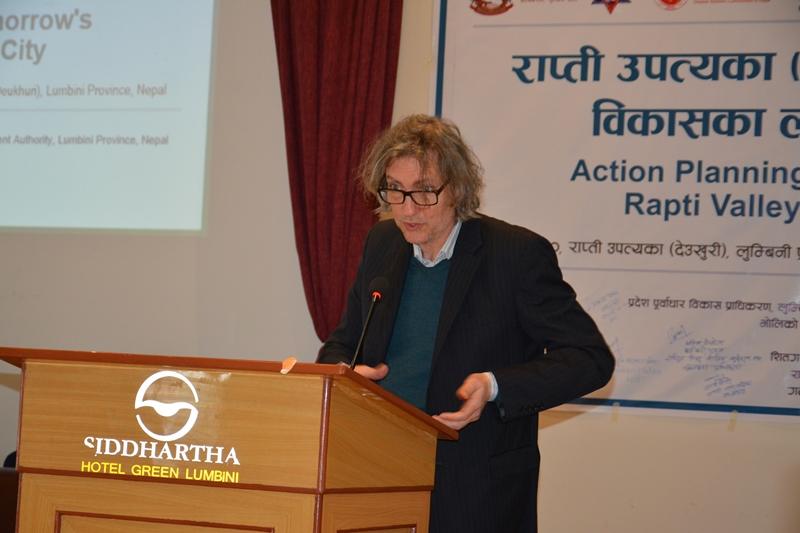
An "Action Planning Workshop for Tomorrow's Rapti Valley (Deukhuri) Capital City" has been organized in Rapti Valley (Deukhuri), Lamahi on March 22, 2024. The primary objective of this one-day workshop was to disseminate key research findings, discuss the processes and efforts aimed at shaping the future of Rapti City, led by Tomorrow's Cities teams under the auspices of the Provincial Infrastructure Development Authority. The workshop aimed to foster consensus among various stakeholders on the path forward.
This program commenced with a brief opening ceremony where Ms. Radhika Aryal, Principal Secretary of Lumbini Province, was invited as the chief guest for the program. In her inaugural remarks, Ms. Aryal, Principal Secretary of Lumbini Province, expressed her commitment to work towards planning the city not only for today but also for 50 years from now. “The premise for the capital has been fixed taking wards from Rapti, Shitaganga, and Gadhwa. We have incorporated the aspirations of the locals and communities of these regions. All the livelihood requirements of the communities have been incorporated and studied in detail. “We are committed to taking it forward with a phase-wise implementation plan. However, I would also like to request the assistance of partner organizations in providing resources needed for the implementation of the master plan,” Ms. Aryal shared.
Speaking at the opening ceremony, Mr. Chhabi Raj Pokhrel, Chief Executive Officer of the Provincial Infrastructure Development Authority (PIDA), Lumbini Province, shared that the Tomorrow’s Cities Project has accomplished the research work in Rapti based on the experiences and lessons learned from Khokana, Lalitpur. “Basically, we wanted to look at how to make Rapti Valley, surrounded by Chure, jungles, and rivers, safer from earthquakes, floods, landslides, and fire hazards. We are committed to incorporating the findings and aspirations of all the people, including indigenous, marginalized, ethnic groups, migrants, and low-income groups. Experts from NSET, IOE, PA, and SIAS extensively discussed issues of hazards in future Rapti. The elected officials have also taken this in,” Mr. Pokhral remarked.
The opening ceremony was followed by a panel discussion on further refinement and implementation of the Master Plan of Rapti Valley (Deukhuri) Capital City. Dr. Suresh Chaudhary facilitated the session while the panelists were Mr. Madhav Bhattarai, Secretary of the Ministry of Physical Infrastructure (session chair), Mr. Chhabi Raj Pokhrel, CEO of PIDA, Mr. Chabi Lal Poudel, Mayor of Shitaganga Municipality, Mr. Prakash Bista, Chairperson of Rapti R.M., Mr. Yam Narayan Sharma, Chairperson of Gadhwa R.M., and Prof. Max Hope, Leeds University, UK. Chhabi Raj Pokhrel, CEO of PIDA, made a keynote presentation on the occasion.
The second panel discussion focused on the Institutionalization of TCDSE approach at the Province and National level. Dr. Ramesh Guragain, Deputy Executive Officer of NSET, conducted the session while the panelists of the session were Mr. Anil Pokhrel, CEO, NDRRMA (session chair), Mr. Rameshwor Marahattha, Joint-secretary, NDRRMA, Mr. Nirajan Ghimire, Secretary, Chief Minister's Office, Mr. Narulal Chaudhary, Mayor, Ghorahi, Sub-municipality, Mr. Jograj Chaudhary, Mayor, Lamahi municipality, Mr. Jaya Ram Uprety, Branch officer, MOFAGA, Professor. Mark Pelling, UCL, and Mr. Surya Narayan Shrestha, ED, NSET. Dr. Ramesh Guragain, DED, NSET, made a keynote presentation on the occasion.
The one-day workshop was formally concluded with a brief concluding ceremony.
Addressing the session, the Chief Executive of NDRRMA, Mr. Anil Pokhrel, pointed out challenges in terms of coordinating and harmonizing between these different local governments to take forward the implementation of Rapti Master Plan. Comparing the unique similarity of Washington D.C. of the USA and Rapti City, the provincial capital of Lumbini Province, Mr. Pokhrel shared that like the USA Capital, Washington D.C., which was established by merging Washington, Maryland, Virginia, three Municipalities: Rapti, Shitganga, and Gadhawa Rural Municipalities came together to establish the provincial capital of Lumbini Province, but it is not without challenge. He also pointed out that large infrastructures alone do not make a good and healthy city. If the city is properly planned, it can contribute to the overall health and well-being of the inhabitants. Additionally, he also emphasized the need to accommodate the urban poor and extended hope that Rapti could ensure the integration of marginalized people in the future city.
Prof. Mark Pelling suggested that PIDA and other government stakeholders should move forward with the coordination and cooperation of various organizations to execute the plan.
Dr. Amod Mani Dixit, President of NSET, acknowledged that to get the opportunity to work in Rapti with experts is delightful, and he also felt challenged to continue this collaboration into the future. “Local planning must relate to national planning since many things are in common between these two. Transdisciplinary and collaboration are important, vertical, and horizontal relations are equally important. We are glad to learn that the activities in Rapti have been an example for other cities as well,” Dr. Dixit shared.
Image gallery




